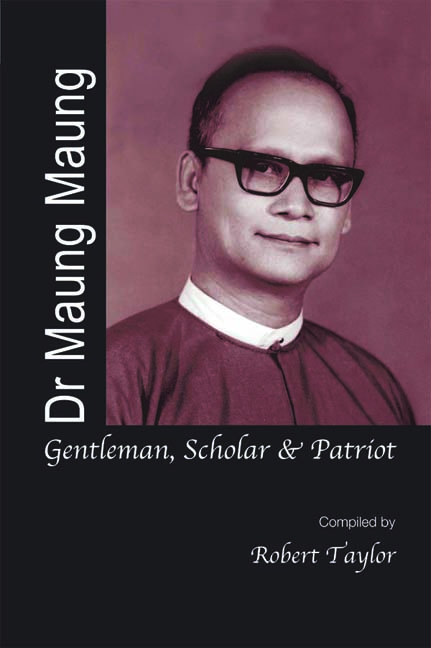Book contents
- Frontmatter
- Epigraph
- Contents
- Preface
- Acknowledgements
- Section I Dr Maung Maung: The Life of a Patriot
- Section II Dr Maung Maung's Approach to Life
- Section III Dr Maung Maung and Biography
- Section IV Dr Maung Maung and Travel
- Section V Dr Maung Maung and the Tatmadaw
- Section VI Dr Maung Maung and the Constitutions of Myanmar
- Section VII Dr Maung Maung and the Presidency
- Bibliography of Dr Maung Maung's Writings
- Index
- The Editor
Section IV - Dr Maung Maung and Travel
Published online by Cambridge University Press: 21 October 2015
- Frontmatter
- Epigraph
- Contents
- Preface
- Acknowledgements
- Section I Dr Maung Maung: The Life of a Patriot
- Section II Dr Maung Maung's Approach to Life
- Section III Dr Maung Maung and Biography
- Section IV Dr Maung Maung and Travel
- Section V Dr Maung Maung and the Tatmadaw
- Section VI Dr Maung Maung and the Constitutions of Myanmar
- Section VII Dr Maung Maung and the Presidency
- Bibliography of Dr Maung Maung's Writings
- Index
- The Editor
Summary
Dr Maung Maung was a keen observer of the world around him. He took great delight in the varieties of the human species and the differences in the environments in which they lived. His London Diary, published in 1952, immediately upon his return from his two year stint in London, was the first work in his many writings which evoked another place and the lessons he learned from the humanity that he observed there. But many of his writings that one would not necessarily classify as travel writing strongly evoke place and time.
Equally, much of what one would describe as Dr Maung Maung's travel writings also indicated his approach to life and learning. He was continually open to new ideas and new thoughts; until the end of his days he was always open to novel ways of looking at issues. His openness to life and change is nicely captured in this excerpt from the London Diary:
I came to England prepared to find fault with everything English; curiosity brought me but it verged on the hostile. I could not help that because I came from a country which was under British rule for about a century.… The White Man enjoyed the privileges which were denied to their Asian colleagues; much higher pay than the Burmese — native — civil servant of the same status; and the Burmese who enjoyed equal status with Englishmen were few. The English civil servants and the executives of commercial firms gathered in the evenings in their exclusive clubs and played bridge and cards, or drank their beer, or, wearing their correct evening dress, danced in the sweltering heat of the Rangoon summer night. …
In that unnatural atmosphere I grew up. In that world of privilege and class I learned to distrust and dislike the English who strutted and swaggered in their gymkhana sipping their gin and juice. The only Englishmen I could bring myself to like and respect was the principal of my college and my professors: I respected them because every young Burmese, at least in my days, were taught to revere his teachers. …
Thus I came to England curious to find out about the people I did not like nor trust. I was curious but was resolved to go about my quest with my mind as open as I could have it: it was not easy to have an open mind, but I tried.
- Type
- Chapter
- Information
- Dr Maung MaungGentleman, Scholar, Patriot, pp. 307 - 352Publisher: ISEAS–Yusof Ishak InstitutePrint publication year: 2008

